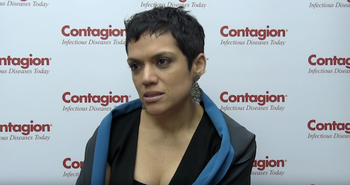
A new study is disputing previous findings that the Zika virus persists in semen for up to 188 days.

A new study is disputing previous findings that the Zika virus persists in semen for up to 188 days.

Those US residents affected by Hurricane Harvey need to be mindful of rodent-borne infections that can spread from displaced rodents.

Alan Gross, PharmD, BCPS-AQID, shares how the Society of Infectious Diseases Pharmacists is working to improve antibiotic stewardship programs in long-term care facilities.

A measles outbreak that affected 79 individuals in the state of Minnesota this spring and summer 2017 was recently declared “over” by the Minnesota Department of Health (MDH).

Joergen Richt, DVM, PhD, discusses animals that have proven susceptible to Zika virus replication after experimental infection.

The results of a new study from the United Kingdom reveal that oral prednisone had no effect on the severity and duration of symptoms in adult patients suffering from bronchitis.

Benznidazole has been granted accelerated approval by the US Food and Drug Administration for use in children aged 2 to 12 years with Chagas disease.

One study has found that pregnant women were more likely not to have their children vaccinated on time, after receiving negative information on vaccines from their friends and family, even after receiving positive information from their doctors.

Flood waters bring an increased risk of these potentially-deadly infections.

Silvia Munoz-Price, MD, PhD, shares a few issues that hospital epidemiologists currently face.

Julian Hurdle, PhD, explains research focused on validating FabK as an essential enzyme to be used as a narrow-spectrum drug target against Clostridium difficile.

Proton pumps inhibitors present risks for individuals living with HIV, dalbavancin can treat MRSA-related pneumonia, probiotics prove deadly against C. difficile, patient involvement increases healthcare practitioners’ hand hygiene, and why delafloxacin is a unique antibiotic for skin infections are the topics that make up this week’s Top 5 articles.

Jason Pogue, PharmD, BCPS-ID, explains the clinical significance of his research team’s findings regarding the use of ceftolozane-tazobactam to treat Pseudomonas infections.

Using a computer model to stimulate the effect of 3 fluoroquinolones against tuberculosis, researchers were able to narrow down which one was most effective.

Alex Rinehart, PhD, explains how cabotegravir is a gender-neutral pre-exposure prophylaxis medication.

Edmond LaVoie, PhD, explains how his team’s approach can be applied in the development of novel drugs for the treatment of drug-resistant infections caused by Gram-negative and Gram-positive bacteria.

Daniel Pilch, PhD, discusses the approach that he and his team took to develop a new drug to fight MRSA.

New research reveals a way to help increase healthcare provider hand hygiene by empowering patients to take an active role.

Kenneth Mayer, MD, discusses some societal challenges that at-risk individuals face today that may keep them from taking pre-exposure prophylaxis.

Milena McLaughlin, PharmD, MSc, explains how antimicrobial shortages differ between high- and low-income countries.

Edmond LaVoie, PhD, describes the properties of prodrug TXA709.

Daniel Pilch, PhD, discusses the potential of Staphylococcus aureus to develop resistance to TXA709.

The less-costly tobacco-plant derived vaccine will be targeted for the developing world.

Jessica Justman, MD, explains the PHIA Project (population-based HIV impact assessments).

Meghan Jeffres, PharmD, discusses the legal liability of prescribing beta-lactams to patients who are allergic to penicillin.

New research on Zika, cases of swine flu infections, parallels between Zika and HIV, a new warning sign of HIV infection, and an increase in cyclospora cayetanensis infections in United States make up the top 5 articles this week.

ason Gallagher, PharmD, BCPS FCCP, FIDSA, explains why clinicians should be aware of the challenges associated with getting antimicrobial susceptibility testing results.

Arjun Srinivasan, MD, discusses how outbreaks can occur in operating rooms.

Jason Pogue, PharmD, BCPS-ID, explains how ceftolozane-tazobactam differs from other beta-lactams for treating Pseudomonas infections.

The pneumococcal vaccine is routinely administered to babies in the United States starting at 2 months of age.